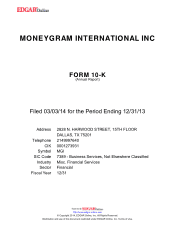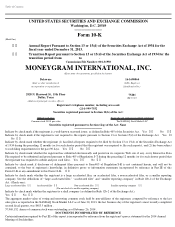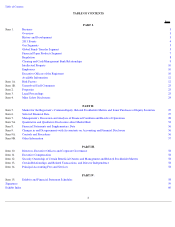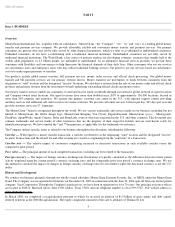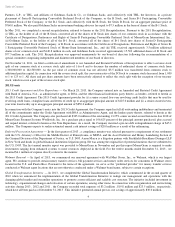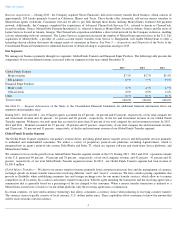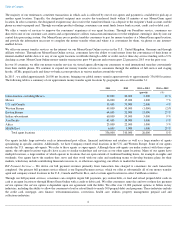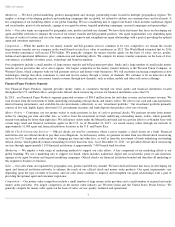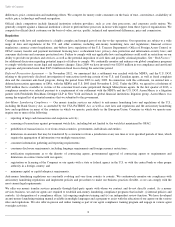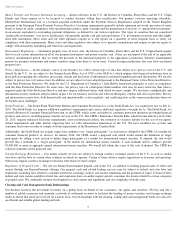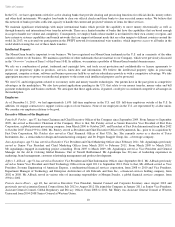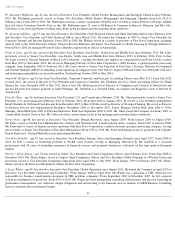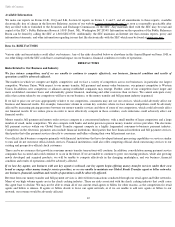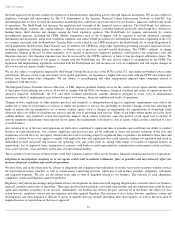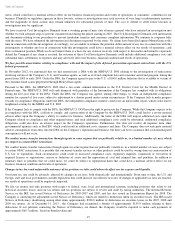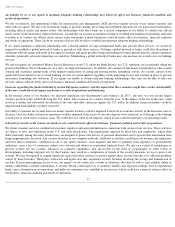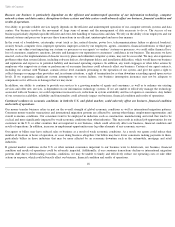MoneyGram 2013 Annual Report Download - page 11
Download and view the complete annual report
Please find page 11 of the 2013 MoneyGram annual report below. You can navigate through the pages in the report by either clicking on the pages listed below, or by using the keyword search tool below to find specific information within the annual report.
Table of Contents
Money Transfer and Payment Instrument Licensing
—
Almost all states in the U.S., the District of Columbia, Puerto Rico and the U.S. Virgin
Islands and Guam require us to be licensed to conduct business within their jurisdictions. Our primary overseas operating subsidiary,
MoneyGram International Ltd, is a licensed payment institution under the Payment Services Regulations adopted in the United Kingdom
pursuant to the European Union Payment Services Directive. Licensing requirements generally include minimum net worth, provision of surety
bonds or letters of credit, compliance with operational procedures, agent oversight and the maintenance of reserves or “permissible investments”
in an amount equivalent to outstanding payment obligations, as defined by our various regulators. The types of securities that are considered
“permissible investments”
vary across jurisdictions, but generally include cash and cash equivalents, U.S. government securities and other highly
rated debt instruments. Most states and our other regulators require us to file reports on a quarterly or more frequent basis to verify our
compliance with their requirements. Many states and other regulators also subject us to periodic examinations and require us and our agents to
comply with anti-money laundering and other laws and regulations.
Escheatment Regulations
—
Unclaimed property laws of every state, the District of Columbia, Puerto Rico and the U.S. Virgin Islands require
that we track certain information on all of our payment instruments and money transfers and, if they are unclaimed at the end of an applicable
statutory abandonment period, that we remit the proceeds of the unclaimed property to the appropriate jurisdiction. Statutory abandonment
periods for payment instruments and money transfers range from three to seven years. Certain foreign jurisdictions also may have unclaimed
property laws.
Privacy Regulations
—
In the ordinary course of our business we collect certain types of data that subject us to privacy laws in the U.S. and
abroad. In the U.S., we are subject to the Gramm-Leach-
Bliley Act of 1999, or the GLB Act, which requires that financial institutions have in
place policies regarding the collection, processing, storage and disclosure of information considered nonpublic personal information. We are also
subject to privacy laws of various states. In addition, we are subject to laws adopted pursuant to the European Union’
s Data Protection Directive,
or the Data Protection Directive. We abide by the U.S. Department of Commerce’
s Safe Harbor framework principles to assist in compliance
with the Data Protection Directive. In some cases, the privacy laws of a European Union member state may be more restrictive than what is
required under the Data Protection Directive and may impose additional duties with which we must comply. We also have confidentiality and
information security standards and procedures in place for our business activities and with our third-
party vendors and service providers. Privacy
and information security laws, both domestically and internationally, evolve regularly, and conflicting laws in the various jurisdictions where we
do business pose challenges.
Dodd
-Frank Act — The Dodd-Frank Wall Street Reform and Consumer Protection Act, or the Dodd-
Frank Act, was signed into law on July 21,
2010. The Dodd-Frank Act imposes additional regulatory requirements and creates additional regulatory oversight for us. The Dodd-
Frank Act
created a Bureau of Consumer Financial Protection, or the CFPB, which issues and enforces consumer protection initiatives governing financial
products and services, including money transfer services, in the U.S. The CFPB’
s Remittance Transfer Rule, which became effective on October
28, 2013, requires enhanced disclosure requirements, error resolution procedures, the extension of vicarious liability for the acts of our agents,
refund requirements and other matters impacting how we offer international remittances in the U.S. We have modified our systems and
consumer disclosures in order to comply with the requirements of the Remittance Transfer Rule.
Additionally, the Dodd-Frank Act assigns supervisory authority over “larger participants” (
as such term is defined by the CFPB) of a market for
consumer financial products or services. In January 2014, the CFPB issued a proposed rule which would amend the definition of larger
participants by adding a new section to define larger participants of a market for international money transfers. If adopted, the rule would
provide that a nonbank is a “larger participant”
in the market for international money transfers if such nonbank and its affiliates provide
$1,000,000 or more in aggregate annual international money transfers. We would fall within the scope of this rule if adopted. The CFPB has
solicited comments on the proposed rule.
Foreign Exchange Regulation
—
Our money transfer services are subject to foreign currency exchange statutes of the U.S., as well as similar
state laws and the laws of certain other countries in which we operate. Certain of these statutes require registration or licensure and reporting.
Others may impose currency exchange restrictions with which we must comply.
Regulation of Prepaid Cards
— We sell our MoneyGram-
branded prepaid card in the U.S., in addition to loading prepaid cards of other card
issuers through our ExpressPayment offering. Our prepaid cards and related loading services may be subject to federal and state laws and
regulations, including laws related to consumer protection, licensing, escheat, anti-
money laundering and the payment of wages. Certain of these
federal and state statutes prohibit or limit fees and expiration dates on and/or require specific consumer disclosures related to certain categories
of prepaid cards. We continually monitor developments in such statutes and regulations and our compliance with the same.
Clearing and Cash Management Bank Relationships
Our business involves the movement of money on a global basis on behalf of our consumers, our agents and ourselves. We buy and sell a
number of global currencies and maintain a network of settlement accounts to facilitate the funding of money transfers and foreign exchange
trades to ensure that funds are received on a timely basis. Our relationships with the clearing, trading and cash management banks are critical to
an efficient and reliable global funding network.
9

